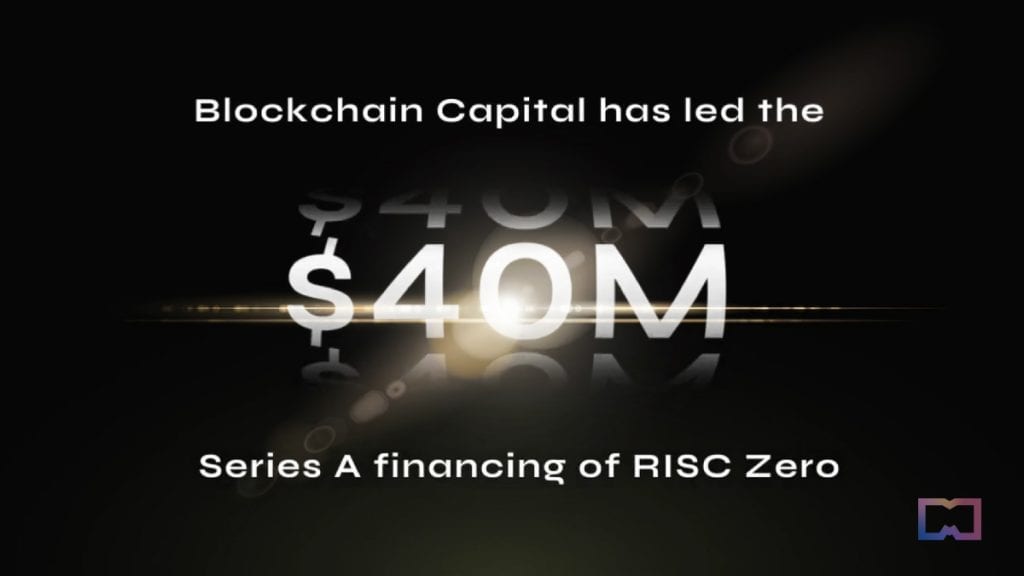In a notable funding achievement, RISC Zero has pulled in $40 million in Series A investment, spearheaded by Blockchain Capital.
In Brief
RISC Zero, the pioneer behind versatile zero-knowledge virtual machine tech, has secured $40 million in a significant Series A funding round.
This funding initiative was led not only by Blockchain Capital but also included participation from Bain Capital Crypto, which previously backed the company during its seed round.
RISC Zero’s advanced ZK Virtual Machine (zkVM) empowers developers to create ZK-enhanced applications using mainstream programming languages like Rust and C++. It boasts features that allow developers to tackle complex software solutions flexibly—without the need for specialized hardware.
In this latest funding round, RISC Zero has managed to gather $40 million, with Blockchain Capital leading the charge alongside Bain Capital Crypto, which was pivotal in the initial seed funding.

This round was noteworthy for its participation from key players in the web3 space, including Galaxy Digital, IOSG, RockawayX, Maven 11, Fenbushi Capital, Delphi Digital, Aglaé Ventures, IOBC, Tribute Labs’ Zero Dao, Figment Capital, and Alchemy Ventures.
RISC Zero’s zkVM allows for the development of applications powered by zero-knowledge proofs with flexibility. It can run complex programs in various sizes, making it adaptable for a range of practical applications without necessitating special hardware setups.
"We're incredibly grateful for the support from our esteemed capital partners and the forward-thinking teams that are collaborating with us to pave a new way forward in computing capacity. We're thrilled to contribute to the creation of a more transparent and reliable future for the internet,\" shared Brian Retford, the CEO and co-founder of RISC.
Understanding the distinction between zkVM and zkEVM is crucial. zkEVM pertains to the execution of smart contracts on Ethereum using the EVM (Ethereum Virtual Machine) bytecode to generate proofs for particular computations, known commonly as rollups.
Conversely, RISC Zero's zkVM offers developers a broader canvas by allowing them to run various software traditionally executable on computers, rather than restricting the functionality solely to Ethereum-focused applications. This opens doors for diverse programs to function within RISC's zkVM architecture, catering to general-purpose computing needs.
For instance, while the EVM executes smart contracts on Ethereum, it can also seamlessly run on the zkVM, generating proofs for an array of computations. This remarkable adaptability expands the types of software that can thrive in the zkVM ecosystem.
Tim Zarrell, a senior software engineer at RISC, mentioned in a recent post that several teams have already explored these possibilities. He highlighted that \"Odra developed a tool to generate proofs for vulnerabilities, and we’re working on an EVM demonstration using the revm crate, which is a Rust-based interpreter for EVM code. This crate aligns well with the RISC Zero zkVM environment.\"
RISC-V, the foundational architecture for zkVM, is designed without in-built features for blockchain-specific structures like wallet addresses. Instead, it focuses on fundamental operations involving data and mathematical computations within memory, giving developers the flexibility to craft programs without deep assembly language knowledge. blog post With this recent influx of funds, RISC is poised to launch its cutting-edge computing platform, currently under development. Bonsai, as it's named, is a zero-knowledge proof network that integrates various tools to facilitate off-chain program execution using inputs derived from smart contract interactions. proof of concept with SputnikVM, zkPoEX also uses SputnikVM Furthermore, it will cater to app development in both cloud and decentralized landscapes, enabling developers to dedicate their efforts to application building without the burden of managing intricate proof orchestration or the underlying server frameworks. revm .
Please keep in mind that the information shared on this page isn’t meant to be construed as legal, financial, or any form of professional advice. It’s crucial only to invest money that you can afford to lose. If you’re uncertain, it’s wise to seek out independent financial counsel. For additional details, we recommend reviewing the issuer's terms and conditions as well as their support resources. At MetaversePost, we strive for accuracy in our reporting, yet the dynamics of market conditions can shift unexpectedly.
Cindy, a journalist at Metaverse Post, focuses on web3, NFT, metaverse, and AI topics, frequently conducting insightful interviews with prominent figures from the Web3 sector. She has interacted with over 30 C-level executives, sharing their invaluable perspectives with our audience. Originally hailing from Singapore, Cindy has moved to Tbilisi, Georgia, and holds a Bachelor’s degree in Communications & Media Studies from the University of South Australia, amassing a decade’s worth of journalism and writing experience.
RISC’s Bonsai computing platform
This message is regarding media inquiries, press releases, and opportunities for interviews. Bonsai A White Hat Hacker has uncovered a critical vulnerability in Scroll, prompting a robust defense of the protocol’s security by its co-founder.
As we look ahead to April 2025, the crypto landscape is evolving, emphasizing key trends and shifts while contemplating the future.
Disclaimer
In line with the Trust Project guidelines Vitalik Buterin is calling for an open discourse among the Ethereum community regarding their goals for decentralization and strategies related to gas limits.







